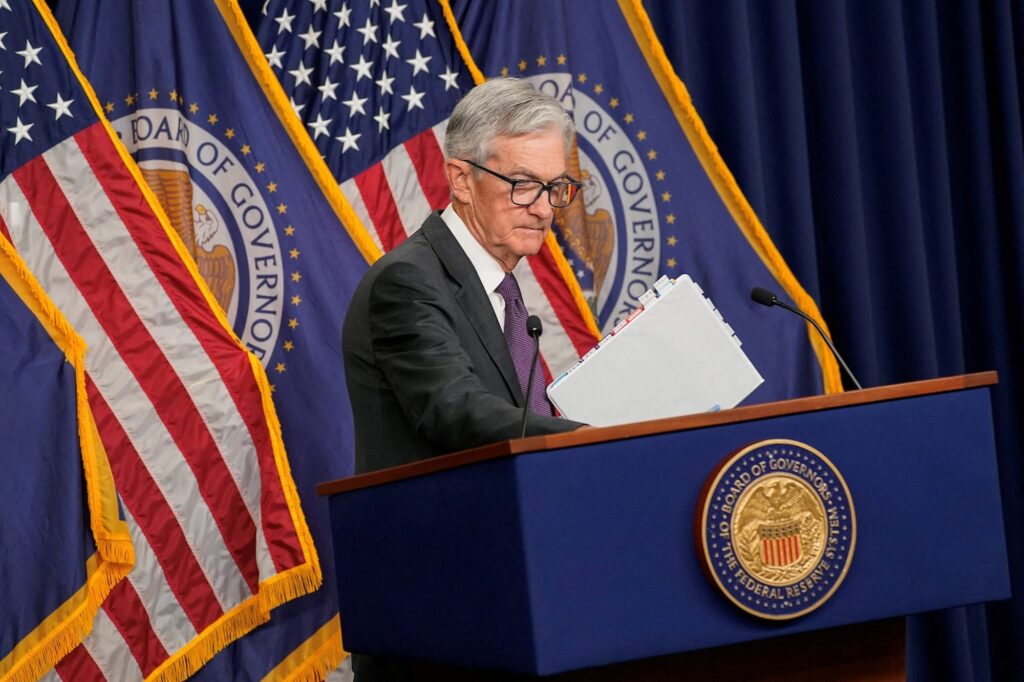
Nathan Howard/Reuters
A year ago, in response to a CNBC reporter’s question about stagflation risk in the US economy, Federal Reserve chairman Jerome Powell replied, “I don’t see the stag or the -flation”.
Too bad the Fed chairman was forced to announce a monetary policy U-turn after the March 2025 Federal Open Market Committee (FOMC) conclave officially downgraded its forecast for US GDP growth from 2.1 percent to 1.7 percent, even as it raised its inflation forecast (on their preferred personal consumption expenditure metric) from 2.5 percent to 2.8 percent.
This means the US central bank expects economic stagnation and a rise in inflation, triggered by Donald Trump’s tariffs.
Powell unfortunately used the word “transitory” to describe the short-term inflationary impact of Trump’s tariffs. History records that the Fed miscalculated the inflation impact of Covid disruption to global supply chains in 2021 and CPI spiked to 9 percent in June 2022, forcing the Fed to respond with the swiftest, most draconian monetary tightening since the Volcker era in the early 1980s.
What if Trump’s tariffs trigger an inflation spike on a similar scale to the Covid-19 virus as the global multilateral trading network is disrupted?
Powell acknowledged that the Fed’s monetary policy toolkit is impotent in combatting tariff-induced inflation but hinted that the central bank may respond to a deceleration in economic growth with one or more rate cuts after the May FOMC.
No region in the world will be immune from the Big Chill of a US recession
Money market futures price two Fed rate cuts by year-end 2025 but Wall Street’s preeminent economists and bond traders predict that the odds of a US recession have significantly risen due to the highest level of business uncertainty since the Covid virus swept the world in February 2020.
Bond King Jeffrey Gundlach estimates recession risk as high as 50 percent, while economist and Fed watcher Ed Yardeni has raised his odds of a US recession from 20 to 35 percent.
Trump’s protectionist ethos and determination to impose reciprocal tariffs on America’s trading partners is a core pillar of his economic policy agenda. This has led to a palpable sense of chaos and uncertainty in the White House and strained relations with Canada, Mexico, the EU and, above all, China.
Retaliation against US tariffs is certain, as both Canada and China demonstrated in March. The elbows-up movement in Canada has intensified boycotts of American consumer products and has led to a plunge in Canadian tourist traffic across the border.
Canadians rightly feel disrespected by Trump’s references to their country as the “51st state” and to their former prime minister as “Governor Trudeau”.
In Germany and China, sales of Tesla cars have plunged as Elon Musk is viewed as the embodiment of Trump’s MAGA revolution and America First isolationism.
Even the global balance of power has been upended by Trump’s decision to bypass the EU and negotiate directly with the Kremlin on a Ukraine peace deal.
While the GCC is largely insulated from Trump’s tariff threats, it will be impacted by the 25 percent tariff slapped on all aluminium imports into the US. The GCC, after all, is the source of 16 percent of American aluminium imports.
A US recession, coupled with a peace deal in Ukraine that would enable the White House to lift sanctions on Russian oil and gas exports, could also trigger a huge fall in crude oil prices. At the same time a fall in the US dollar will increase the cost of GCC imports from Europe, China and Asia’s industrial constellation.
Countries such as Japan, South Korea, Taiwan and India will be forced to offset their bilateral trade surpluses with the US by scaling up purchases of American LNG tanker cargoes, replacing existing long-term LNG supply contracts with Qatar and other GCC gas exporters.
No region in the world will be immune from the Big Chill of a US recession, a continued fall in the US dollar and a global trade war that is certain to raise the price of manufactured goods worldwide.
A fall in crude oil and LNG prices will also increase fiscal pressures on GCC energy exporters, whose budget breakeven prices are even now $25-$35 above the $70 price of spot Brent crude.
A fall in global trade volumes is bearish for the GCC’s seminal role as a node of global container shipping, air freight and logistics. Trump has deliberately undermined the globalisation paradigm within which the GCC economies have operated for the past five decades.
His callous treatment of Western allies and trading partners also poses diplomatic dilemmas for the GCC’s chancelleries who must now balance their traditional Uncle Sam security umbrella with economic roles as strategic suppliers of energy to China, the world’s largest crude oil and LNG importer.
An embryonic Cold War 2.0 between Washington and Beijing is an economic and diplomatic imbroglio for the GCC.
Matein Khalid is an investor in global financial markets and board adviser to leading family offices in the UAE and Saudi Arabia



